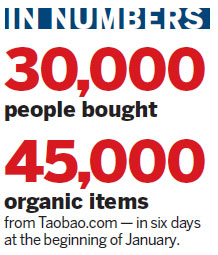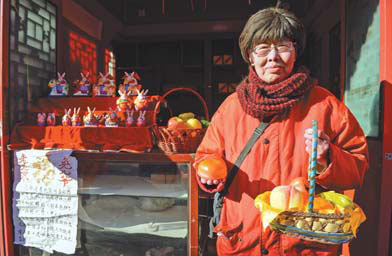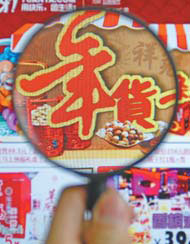Nostalgic appetites
Updated: 2014-01-26 07:20
By Deng Zhangyu and Han Bingbin(China Daily)
|
|||||||||
China's progress in the past 30 years is most noticeable when it comes to food on the table. Deng Zhangyu and Han Bingbin look back in wonder at how the tastes of childhood have changed and are changing as the Lunar New Year approaches.
For most Chinese children through the ages, the Lunar New Year is a time when rare goodies magically appear, adding to the celebrations heralding the arrival of a new year.
It has long meant a chance to sample sweets and snacks not normally affordable. The images dredged from our collective memories are whimsical. It draws up scenes of parents or grandparents bringing home irresistible, edible temptations. There would be pieces of salted meat and preserved chickens hanging in a row being air-dried under the eaves, with fishes being fattened and swimming in a huge porcelain vat right below.
Groundnuts, melon seeds and sunflower seeds, usually bought in sacks, are tucked under the bed. Peanut brittles and sesame candies are stored in weathered biscuit tins and carefully placed on top of the wardrobe.
These are memories recalled with gratitude today when almost everything is so easily accessible and sweets and snacks are just a neighborhood shop away.
Better transportation and preservation technologies, such as vacuum packing, have made almost every regional specialty a national treat, from air-dried yak meat from the Tibet and Inner Mongolia autonomous regions to freshly steamed Cantonese water chestnuts or turnip cakes to packs of pickled vegetables from Tianjin.
Thanks primarily to growing wealth, Lunar New Year tables have not only crossed regional barriers but also national borders. From American orange juice to French wine, from Swiss chocolate to Danish cookies, the Chinese are expanding their "special purchases for Spring Festival" to an incredible range.
But the price for such diversity may be a loss of the simple tastes of childhood.
What may have been sacrificed to such industrialized and commercialized abundance is the connection to land and regional cultures, and a widening divide as an increasingly urban group of middle-class Chinese emerges.
There is also growing concern over food safety in tandem with problems of urbanization, such as pollution from too many cars and industrial emissions.
Both the nostalgic appetite and safety concerns have fueled a demand for slow food, organic food and locally produced food, giving rise to a growing number of alternative food networks and production chains in the form of farmland rental, farmers' markets and organic restaurants.

This has also significantly influenced Spring Festival purchasing philosophies.
For this special occasion, people are more inclined to pay a premium for treats tagged as "natural", "sustainable" and "organic".
When China's largest online shopping website Taobao launched an organic market at the beginning of January, about 30,000 people bought 45,000 organic items via mouse click - in six days.
Another indicator comes from an online store selling organic rice, the price of which is almost five times more than regular rice. Yet the store sold more than 100 bags of rice within two weeks as shoppers prepared for the annual year-end reunion dinner.
Affluent urbanites' passionate embrace of the organic food movement has motivated big entrepreneurs to delve into the organic food industry.
Ding Lei, CEO of the Chinese Internet company Netease Inc, has invested in a large organic pig farm since 2009. His pigs are said to be raised for an entire year and fed corn and cereals. But he raises the pigs only for his own employees.
Meanwhile, Chu Shijian, a tobacco tycoon who lost all his money overnight, started an organic orange orchard in 2002.

Now Chu's oranges are the big thing for people buying fruits for Spring Festival.
Thousands of tons of oranges are consumed during the festive period, and Chu's oranges are always running out.
Thanks to the Internet and its facilitation of online shopping, consumers now exercise great power with a simple click of the mouse, as they broaden their choices from just the bricks-and-mortar local market to a worldwide supermarket onscreen.
And so, abalone from Australia, geoduck clams from Canada, salmon from Norway, Berkshire pigs from Japan and Angus Beef from Europe may now join French macaroons, Belgian chocolates, Danish cookies and American pistachios on the festive Lunar New Year table.
All it takes is a click. Really.
Contact the writers through dengzhangyu@chinadaily.com.cn.
|
Liu Xiuhua displays traditional wax fruits at a fair before the Spring Festival in Beijing's Shichahai area on Jan 21. Li Xin / Xinhua |
|
Convenience is causing more people to shop online for the Spring Festival gift-giving season, nianhuo (the characters magnified in the photo). Mai Tian / for China Daily |
(China Daily 01/26/2014 page1)

